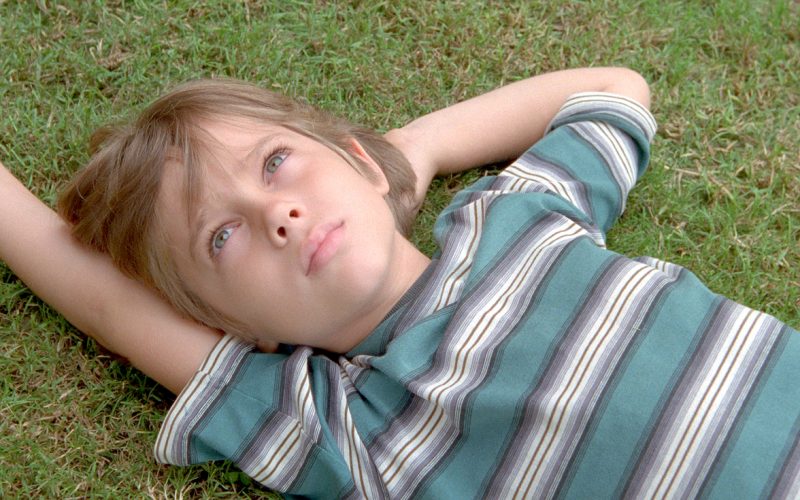
Courtesy Photo In the first scene from “Boyhood,” Mason — played by Ellar Coltrane over the course of 12 years starting in 2002 — the main character of “Boyhood” daydreams as he watches the after-school sky float by.
Boyhood
4 out of 5 stars
Written and Directed by Richard Linklater
Starring Ellar Coltrane, Patricia Arquette, Ethan Hawke
Rated R, 166 minutes
By Nick Brothers
A film 12 years in the making, “Boyhood” will be coming to the Fayetteville Malco Razorback Aug. 8.
Written and directed by Richard Linklater, (“School of Rock,” “A Scanner Darkly”) Boyhood follows the physical and personal growth of Mason (Ellar Coltrane) from first grade to the beginning of college as his divorced parents (Patricia Arquette and Ethan Hawke) raise him throughout the 2000s. As we watch Coltrane grow up on screen alongside his sister — Linklater’s daughter, Loreli — it’s hard not to think about your own experience growing up. This method, filming over 12 years, is groundbreaking filming, really.
By far, the takeaway of this film is watching Coltrane grow up as his character does, and watching his character mature through different phases of boyhood. The dedication to the filming manages to hit a truth that most biopic movies just can’t hit, and honestly may never hit. Watching it all felt so authentic. Rarely do theater audiences get a chance to experience a character development like they do with Mason.
As Mason grows, it’s hard not to empathize with where you were in that time period and how you perceived things like the U.S. involvement in Iraq and Afghanistan or the 2008 Obama-McCain election. The first 90 minutes of the movie are like one huge wave of nostalgia. It’s poignant that there is an inner pain associated with nostalgia, and this feeling — in effect — creates two plots for the viewer — both Mason’s story and the mirror of the viewer’s own experience of growing up (or raising a child).
Another strong aspect is how the youth culture is perfectly captured. Just about every scene in the younger parts of Mason’s story evoked several vivid memories of mine from when I was young. The film gets it all from the themed release parties of Harry Potter books, playing Oregon Trail in school, Xbox and Halo 2, trampoline games and Motorola Razr phones. The soundtrack spans the entirety of music of the 00s, starting with “Yellow” by Coldplay into the high school “classic” that was “Crank Dat Soulja Boy,” and beyond.
Again, being as empathetic as possible seems to be the goal of the movie, and it just hits it in spades. The film is aimed at two distinct generations. The ones that were born in the late 90s, and the ones that raised them. The film really goes to show the whole “parents are people, too,” reality of the role a parent plays in life.
As far as the plot? I would argue there isn’t much of one, kinda like life. Just as we live each day adapting to what the world gives and throws at us, the plot progress the same way. What I’m saying is, it isn’t a bunch of predictable character cliches that we’ve come to expect from maturity stories, nor is it all that dramatic. This sort of minimalist plot leads to a different sort of experience than we’ve been used to as viewers. There really isn’t an inciting incident followed by three acts and a climatic crisis. It’s simply Mason’s life, and the conflict he faces seemingly happens naturally.
So, keep this in mind, if you’re looking to be entertained, go see Guardians of the Galaxy (which was awesome, by the way). This film is much more of a pensive, reflective (well, indie) type of film. Go see this to see a different kind of movie.
As far as the acting goes, it’s done quite well for how young some of the actors were. There are times when you’ll groan, and you’ll shudder — because the actors get it exactly right. Probably the most challenging time period, junior high, is done embarrassingly well in all its terrible self-consciousness. Just like junior high, the kids are shooting homophobic slurs at each other and they boast about their sexual bravado. Let’s not forget the cringe-worthy first kiss, either.
Personally, I feel like this film was aimed at people near my age, about 18-25. It hits the culture of my youth perfectly. Everything from the soundtrack to the video games Mason and his friends are playing. I recommend seeing this if you fit that age range, or if you have a son in that age range.
Overall, growing up is a tough thing to do. There may not be a better artistic interpretation of that than Linklater’s “Boyhood.” In my opinion, a “good” film really makes you think. Undoubtedly, “Boyhood” makes you think about your own life, and those around you, for days afterwards. This movie is something I’m glad I was alive to experience. This sort of project will probably not be done again for a very long time. Great work Linklater, et al.



